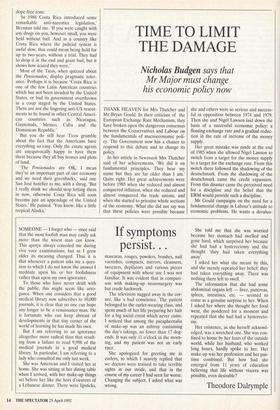If symptoms
persist.. .
SOMEONE — I forget who — once said that the most foolish man may easily ask more than the wisest man can know. This apercu always consoled me during viva voce examinations; but as I grew older its meaning changed. Thus it is that whenever a patient asks me a ques- tion to which I do not know the answer I meditate upon his or her foolishness rather than upon my own ignorance.
To those who have never dealt with the public, this might seem like arro- gance. When one considers that a good medical library now subscribes to 10,000 journals, it is clear that no one can hope any longer to be a renaissance man. He is fortunate who can keep abreast of developments in that tiny corner of the world of learning he has made his own.
But I am referring to an ignorance altogether more radical than that result- ing from a failure to read 9,998 of the medical journals in a good medical library. In particular, I am referring to a lady who consulted me only last week.
She was American and I visited her at home. She was sitting at her dining table when I arrived, with her make-up things set before her like the hors d'oeuvres of a Lebanese dinner. There were lipsticks, mascaras, rouges, powders, brushes, nail varnishes, compacts, mirrors, cleansers, tweezers, depilators and various pieces of equipment with whose use I was not familiar. It was evident that in compari- son with making-up neurosurgery was but crude hackwork.
The television nagged away in the cor- ner, like a bad conscience. The patient belonged to the curler-wearing class, and spent much of her life preparing her hair for a big social event which never came. I noticed that among the paraphernalia of make-up was an ashtray containing the day's takings, no fewer than 17 dog- ends. It was only 11 o'clock in the morn- ing, and my patient was not an early riser.
She apologised for greeting me in curlers, to which I suavely replied that we doctors were trained to take terrible sights in our stride, and that in the course of my career I had seen far worse. Changing the subject, I asked what was wrong.
She told me that she was worried because her stomach had swelled and gone hard, which surprised her because she had had a hysterectomy and she thought 'they had taken everything away'.
I asked her what she meant by this, and she merely repeated her belief: they had taken everything away. There was nothing there left to swell.
The information that she had some abdominal organs left — liver, pancreas, spleen, intestines, etc. — seemed to come as a genuine surprise to her. When I asked her where she thought her food went, she pondered for a moment and repeated that she had had a hysterecto- my.
Her existence, as she herself acknowl- edged, was a wretched one. She was con- fined to home by her fears of the outside world, while her husband, who worked long hours, hardly spoke to her. Her make-up was her profession and her pas- time combined. But how had she emerged from 11 years of education believing that life without viscera was possible, even desirable?
Theodore Dalrymple


























































 Previous page
Previous page